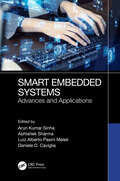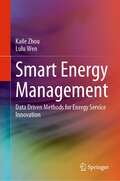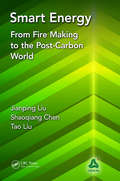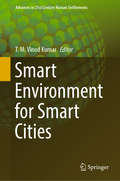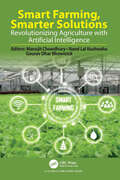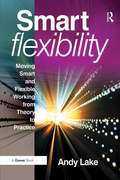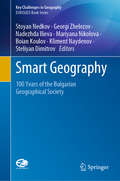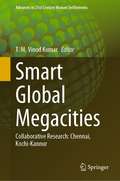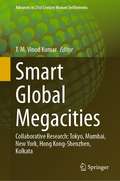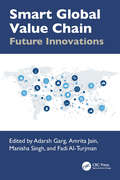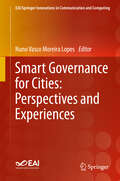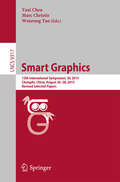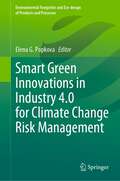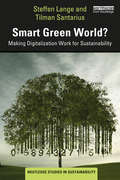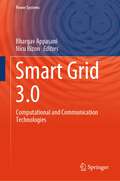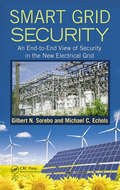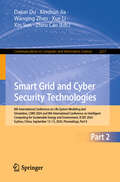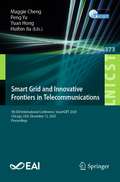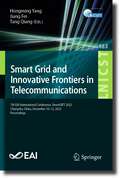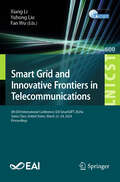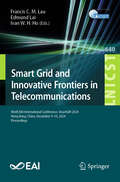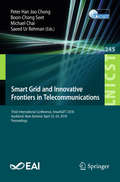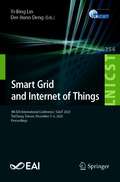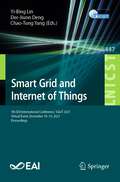- Table View
- List View
Smart Embedded Systems: Advances and Applications
by Abhishek Sharma Arun Kumar Sinha Luiz Alberto Pasini Melek Daniele D. Caviglia"Smart Embedded Systems: Advances and Applications" is a comprehensive guide that demystifies the complex world of embedded technology. The book journeys through a wide range of topics from healthcare to energy management, autonomous robotics, and wireless communication, showcasing the transformative potential of intelligent embedded systems in these fields. This concise volume introduces readers to innovative techniques and their practical applications, offers a comparative analysis of wireless protocols, and provides efficient resource allocation strategies in IoT-based ecosystems. With real-world examples and in-depth case studies, it serves as an invaluable resource for students and professionals seeking to harness the power of embedded technology to shape our digital future. Salient Features: 1. The book provides a comprehensive coverage of various aspects of smart embedded systems, exploring their design, implementation, optimization, and a range of applications. This is further enhanced by in-depth discussions on hardware and software optimizations aimed at improving overall system performance. 2. A detailed examination of machine learning techniques specifically tailored for data analysis and prediction within embedded systems. This complements the exploration of cutting-edge research on the use of AI to enhance wireless communications. 3. Real-world applications of these technologies are extensively discussed, with a focus on areas such as seizure detection, noise reduction, health monitoring, diabetic care, autonomous vehicles, and communication systems. This includes a deep-dive into different wireless protocols utilized for data transfer in IoT systems. 4. This book highlights key IoT technologies and their myriad applications, extending from environmental data collection to health monitoring. This is underscored by case studies on the integration of AI and IoT in healthcare, spanning topics from anomaly detection to informed clinical decision-making. Also featured is a detailed evaluation and comparison of different system implementations and methodologies. This book is an essential read for anyone interested in the field of embedded systems. Whether you're a student looking to broaden your knowledge base, researchers looking in-depth insights, or professionals planning to use this cutting-edge technology in real-world applications, this book offers a thorough grounding in the subject.
Smart Energy Management: Data Driven Methods for Energy Service Innovation
by Kaile Zhou Lulu WenThis book provides a relatively whole view of data-driven decision-making methods for energy service innovation and energy system optimization. Through personalized energy services provision and energy efficiency improvement, the book can contribute to the green transformation of energy system and the sustainable development of the society. The book gives a new way to achieve smart energy management, based on various data mining and machine learning methods, including fuzzy clustering, shape-based clustering, ensemble clustering, deep learning, and reinforcement learning. The applications of these data-driven methods in improving energy efficiency and supporting energy service innovation are presented. Moreover, this book also investigates the role of blockchain in supporting peer-to-peer (P2P) electricity trading innovation, thus supporting smart energy management. The general scope of this book mainly includes load clustering, load forecasting, price-based demand response, incentive-based demand response, and energy blockchain-based electricity trading. The intended readership of the book includes researchers and engineers in related areas, graduate and undergraduate students in university, and some other general interested audience. The important features of the book are: (1) it introduces various data-driven methods for achieving different smart energy management tasks; (2) it investigates the role of data-driven methods in supporting various energy service innovation; and (3) it explores energy blockchain in P2P electricity trading, and thus supporting smart energy management.
Smart Energy: From Fire Making to the Post-Carbon World
by Tao Liu Jianping Liu Shaoqiang ChenSmart Energy: From Fire Making to the Post-Carbon World first traces the history of mankind's discovery and use of energy. It then reviews contemporary issues such as global warming, environmental deterioration, depletion of carbon energy sources, and energy disputes. Next, it evaluates technical innovations, system change, and international cooperation. Then, it tackles how civilization will evolve in light of meeting future energy needs, how Smart Energy will meet these needs, and defines the global mission. It ends with a summary of China’s vision of a Smart Energy future. This is required reading for everyone concerned about energy, environment, economy, human survival, and development .
Smart Environment for Smart Cities (Advances in 21st Century Human Settlements)
by T.M. Vinod KumarThis book discusses the design and practice of environmental resources management for smart cities. Presenting numerous city case studies, it focuses on one specific environmental resource in each city. Environmental resources are commonly owned properties that require active inputs from the government and the people, and in any smart city their management calls for a synchronous combination of e-democracy, e-governance and IOT (Internet of Things) systems in a 24/7 framework. Smart environmental resources management uses information and communication technologies, the Internet of Things, internet of governance (e-governance) and internet of people (e-democracy) along with conventional resource management tools to achieve coordinated, effective and efficient management, development, and conservation that equitably improves ecological and economic welfare, without compromising the sustainability of development ecosystems and stakeholders.
Smart Farming, Smarter Solutions: Revolutionizing Agriculture with Artificial Intelligence
by Manojit Chowdhury Nand Lal Kushwaha Gourav Dhar BhowmickSmart Farming, Smarter Solutions: Revolutionizing Agriculture with Artificial Intelligence presents a comprehensive exploration of how Artificial Intelligence (AI) technologies are transforming modern agriculture. With contributions from experts across the globe, the book covers a wide spectrum of smart farming innovations including AI-powered crop monitoring, precision irrigation, robotics, drones, big data, and supply chain optimization. This volume, designed for researchers, practitioners, students, and policy-makers, showcases cutting-edge developments that promote sustainable and climate-resilient agriculture. It is an essential reference for understanding the intersection of artificial intelligence and agriculture in building future-ready farming systems.
Smart Flexibility: Moving Smart and Flexible Working from Theory to Practice
by Andy LakeSmart Flexibility: Moving Smart and Flexible Working from Theory to Practice is an engaging and practical management book to help organisations implement Smart Working, and take a business-focused approach to ’Flexible Working’. Written for managers at the leading edge of change, Andy Lake takes a strategic, comprehensive and integrated approach to Smart and Flexible Working. Taking an evidence-based approach, he sets out how to achieve measurable benefits across the Triple Bottom Line. Starting from the underlying principles and the compelling context for change, he takes a pragmatic approach to delivering change in each of the key areas of People (HR), Property and Technology. The book is designed to help professionals understand the vital connecting points across disciplines as well as innovations in their own fields. And there are separate chapters that look at the real impacts for sustainability, the impacts for ’Smart Government’, how to manage the ’Anywhere Anytime Team’ and how to take people on the journey towards a Smart Flexibility organisational culture. The book includes many insights based on the author’s experience and the latest research, many practical techniques for implementing change plus ten new case studies. Smart Flexibility is essential reading for anyone involved in workplace change and increasing the efficiency of organisations. It is aimed at managers who need to deliver change, and will be of great interest to consultants in the fields of workplace design, new technologies and HR/OD/Training.
Smart Geography: 100 Years of the Bulgarian Geographical Society (Key Challenges in Geography)
by Boian Koulov Georgi Zhelezov Stoyan Nedkov Nadezhda Ilieva Mariyana Nikolova Kliment Naydenov Steliyan DimitrovThis book focuses on new and innovative spatial approaches based on smart solutions and developed in the field of geography and related interdisciplinary fields such as urban and regional studies, landscape ecology and ecosystem services. It includes contributions from a conference dedicated to the 100th anniversary of the Bulgarian Geographical Society.In turn, the book reveals how 21st-century geography is expected to facilitate the development of human capital and the knowledge society, while also offering place-specific solutions for sustainable regional development and utilization of the planet’s natural and human capital to improve social wellbeing. This volume is intended for the global geographical research community, as well as professionals and practitioners in all fields that deal with space, including regional planners and environmental managers.
Smart Global Megacities: Collaborative Research: Chennai, Kochi-Kannur (Advances in 21st Century Human Settlements)
by T. M. Vinod KumarThis book, the second volume, highlights 7 out of a total of about 36 megacities in the World which by definition have 10 million inhabitants. The cities/chapters presented in this book are based on recent advance such as the wide use of ICT, IOT, e-Governance, e-Democracy, smart economy and flattening and acceleration of the world that is taking place in recent times as reported by 3 times Pulitzer Prize Winner Thomas Friedman. It therefor departs from other ideologies where only a certain megacity qualifies for the title of smart global megacities while in reality every megacity can, and presents how smart global megacities can be created.
Smart Global Megacities: Collaborative Research: Tokyo, Mumbai, New York, Hong Kong-Shenzhen, Kolkata (Advances in 21st Century Human Settlements)
by T. M. Vinod KumarThis book, the first volume, highlights 8 out of a total of about 36 megacities in the World which by definition have 10 million inhabitants. The cities/chapters presented in this book are based on recent advance such as the wide use of ICT, IOT, e-Governance, e-Democracy, smart economy and flattening and acceleration of the world that is taking place in recent times as reported by 3 times Pulitzer Prize Winner Thomas Friedman. It therefor departs from other ideologies where only a certain megacity qualifies for the title of smart global megacities while in reality every megacity can, and presents how smart global megacities can be created.
Smart Global Value Chain: Future Innovations
by Fadi Al-Turjman Adarsh Garg Manisha Singh Amrita JainInnovation is a critical facilitator in today’s fast-changing global value chain landscape. This book describes the interplay of technological breakthroughs enabling efficiency and intelligence within value chains, making them smart and sustainable. From service models and smart technologies to the application of smart global value chains across sectors, this book offers a unique insight into the transformational role of smart global value chains in bringing agility and sustainability to the global value chain ecosystem.This book is an essential guide for academics, industry leaders, and policymakers to navigate the future where smart technologies like artificial intelligence, machine learning, blockchain, Internet of Things, and beyond reshape the global economic landscape.
Smart Governance for Cities: Perspectives and Experiences (EAI/Springer Innovations in Communication and Computing)
by Nuno Vasco Moreira LopesThis book provides theoretical perspectives and practical experiences on smart governance for smart cities. It presents a balanced linkage between research, policies and practices on this area. The authors discuss the sustainability challenges raised by rapid urbanization, challenges with smart governance models in various countries, and a new governance paradigm seen as a capable approach able to overcome social, economic and environmental sustainability problems. The authors include case studies on transformation, adaption and transfers; and country, regional, municipal contextualization. Also included are best practices on monitoring and evaluating smart governance and impact assessment. The book features contributions from researchers, academics, and practitioners in the field. Analyzes smart governance for cities from a variety of perspectives and a variety of sectors – both in theory and in practiceFeatures information on the linkage between United Nations Sustainable Development Goals and smart governanceCovers the connection between research, policies and practice in smart governance for smart cities
Smart Graphics
by Yaxi Chen Marc Christie Wenrong TanFor centuries, artists and designers have been creating communicative graphics. With the advent of new forms of media, the emergence of paradigms such as ubiquitous computing, and the rapid evolution of interaction devices, there is a continuous cycle of renewal of the technologies and methods to support artists, interaction designers and developers. Developingnewapproachesrequiresanunderstandingofthe fundamentals of perception and cognition as they relate to interaction and communication te- nologies, together with arti?cial intelligence and computer graphics techniques to automate reasoning and enhance cognition. Smart Graphics is in essence an interdisciplinary endeavor and brings together the ?elds of computer graphics, arti?cial intelligence, cognitive science, graphic design and ?ne art. The International Symposium on Smart Graphics 2008 was held on August 27-29 in Rennes, France. It was the ninth event in a series which originally started in 2000 as an American Association for Arti?cial Intelligence Spring Symposium and has taken place every year since then. Due to the high quality of the papers submitted this year, the ProgramCommittee decided to accept 17 fullpapers(insteadoftheusual15),9shortpapersand3systemdemonstrations. The acceptance rate for full papers was 34%. This year's meeting included a discussion as to the nature of the shape, contentandfutureoftheevent. Representativesfromdi?erentcommunitieswere invitedtogivetheiropinions,andtheorganizingcommitteewouldliketowarmly thank them here. Such questions as the ongoing viability of the symposium and theconsequencesofco-locatingSmartGraphicswithotherlargerresearchevents led to interesting debates and have prepared the groundwork for what could be the future of the Smart Graphics conference series.
Smart Graphics: 13th International Symposium, SG 2015, Chengdu, China, August 26-28, 2015, Revised Selected Papers (Lecture Notes in Computer Science #9317)
by Yaxi Chen, Marc Christie and Wenrong TanThis book constitutes the proceedings of the 13th International Symposium on Smart Graphics, SG 2015, held in Chengdu, China, in August 2015. The 17 full and 3 short papers presented in this volume were carefully reviewed and selected from 35 submissions. They are organized in topical sections named: graphics, sketching and visualization, automation and evaluation, image processing, and posters and demo session.
Smart Green Innovations in Industry 4.0 for Climate Change Risk Management (Environmental Footprints and Eco-design of Products and Processes)
by Elena G. PopkovaThis book is devoted to strengthening the theoretical and methodological basis, systematization of international experience, and scientific elaboration of prospects for developing a climate-smart economy and business as a vector of the sustainable development of Industry 4.0 in the Decade of Action. The first part of the book focuses on climate-responsible entrepreneurship in support of the sustainable development of Industry 4.0. The part systematizes best practices for climate-smart green innovations across sectors of the digital economy. The third part reveals the experience of climate risk management based on smart green innovations in regions and countries. Particular attention is paid to the best practices of the European Union (EU) and the Eurasian Economic Union (EAEU). The book ends with part four, which explores ESG climate risk management and green finance in support of combating climate change. The book’s novelty is that it rethinks the environmental footprints of Industry 4.0 from the perspective of climate risks and their management. The theoretical significance of the book lies in the formation of an innovative concept of climate change risk management, in which the economy, society, nature, and technology are presented and interact effectively. The book is intended for scientists. In this book, they will find an innovative and systemic vision of smart green innovations in Industry 4.0 for climate change risk management.
Smart Green World?: Making Digitalization Work for Sustainability (Routledge Studies in Sustainability)
by Tilman Santarius Steffen LangeIn this book, Steffen Lange and Tilman Santarius investigate how digitalization influences environmental and social sustainability. The information revolution is currently changing the daily lives of billions of people worldwide. At the same time, the current economic model and consumerist lifestyle needs to be radically transformed if society is to overcome the challenges humanity is facing on a finite planet. Can the much-discussed disruption potential of digitalization be harnessed for this purpose? Smart Green World? provides guiding principles for a sustainable digital society and develops numerous hands-on proposals for how digitalization can be shaped to become a driving force for social transformation. For instance, the authors explain why more digitalization is needed to realize the transition towards 100% renewable energy and show how this can be achieved without sacrificing privacy. They analyze how the information revolution can transform consumption patterns, mobility habits and industry structures – instead of fostering the consumption of unneeded stuff due to personalized commercials and the acceleration of life. The authors reveal how Artificial Intelligence and the Industrial Internet of Things pose novel environmental challenges and contribute to a polarization of income; but they also demonstrate how the internet can be restored to its status as a commons, with users taking priority and society at large reaping the benefits of technological change in a most democratic way. Providing a comprehensive and practical assessment of both social and environmental opportunities and challenges of digitalization, Smart Green World? Making Digitalization Work for Sustainability will be of great interest to all those studying the complex interrelationship of the twenty-first-century megatrends of digitalization and decarbonization.
Smart Grid 3.0: Computational and Communication Technologies (Power Systems)
by Nicu Bizon Bhargav AppasaniThis book is the first on Smart Grid 3.0.The book presents literature reviews of recent computational and communication technologies and their application in the evolution of smart grids to Smart Grid 3.0. It offers new control solutions, architectures and energy management strategies that are based on artificial intelligence and deep learning techniques.The book details the hardware and software implementation of fault identification or detection based on synchrophasor data and machine learning. It also discusses blockchain architectures for smart grid applications such as electric vehicles, home automation and automatic metering infrastructure.
Smart Grid Security: An End-to-End View of Security in the New Electrical Grid
by Gilbert N. Sorebo Michael C. EcholsThe Smart Grid has the potential to revolutionize electricity delivery systems, and the security of its infrastructure is a vital concern not only for cyber-security practitioners, engineers, policy makers, and utility executives, but also for the media and consumers. Smart Grid Security: An End-to-End View of Security in the New Electrical Grid ex
Smart Grid and Cyber Security Technologies: 8th International Conference on Life System Modeling and Simulation, LSMS 2024 and 8th International Conference on Intelligent Computing for Sustainable Energy and Environment, ICSEE 2024, Suzhou, China, September 13–15, 2024, Proceedings, Part II (Communications in Computer and Information Science #2217)
by Xin Sun Xue Li Dajun Du Xinchun Jia Wanqing Zhao Zhiru CaoThe five-volume set constitutes the thoroughly refereed proceedings of the 8th International Conference on Life System Modeling and Simulation, LSMS 2024, and of the 8th International Conference on Intelligent Computing for Sustainable Energy and Environment, ICSEE 2024, which were held during September 13-15, in Suzhou, China. The 34 papers presented were carefully reviewed and selected from over 496 submissions. The LSMS and ICSEE international conference series aim to bring together international researchers and practitioners in the fields of advanced methods for life system modeling and simulation, as well as advanced intelligent computing theory, methodologies, and engineering applications in achieving net zero across all sectors to tackle the global climate change challenge.
Smart Grid and Innovative Frontiers in Telecommunications: 5th EAI International Conference, SmartGIFT 2020, Chicago, USA, December 12, 2020, Proceedings (Lecture Notes of the Institute for Computer Sciences, Social Informatics and Telecommunications Engineering #373)
by Yuan Hong Peng Yu Maggie Cheng Huibin JiaThis book constitutes the refereed proceedings of the 5th International Conference on Smart Grid and Innovative Frontiers in Telecommunications, SmartGIFT 2020, held in Chicago, USA, in December 2020. Due to COVID-19 pandemic, the conference was held virtually.The 13 full papers were selected from 28 submissions and focus on the development of digital technology and smart grid which enables the smooth integration of centralised or distributed power generation, energy storage, and distribution. The papers are grouped thematically into: Communications, Networks and Services; Security and Stable Control; Internet of Power Things and Big Data.
Smart Grid and Innovative Frontiers in Telecommunications: 7th EAI International Conference, SmartGIFT 2022, Changsha, China, December 10-12, 2022, Proceedings (Lecture Notes of the Institute for Computer Sciences, Social Informatics and Telecommunications Engineering #483)
by Hongming Yang Jiang Fei Tang QiangThis book constitutes the refereed proceedings of the 7th International Conference on Smart Grid and Innovative Frontiers in Telecommunications, SmartGIFT 2022, held in Changsha, China, in December 10-12, 2022The 44 full papers were selected from 116 submissions and focus on new challenges and opportunities of intelligent technologies in new energy systems.The papers are the papers are divided into the following areas: Simulation and analysis of the integrated energy system, disaster prevention & reduction for power grid, industry 4.0 applications, flexible planning and regulation techniques in smart grids, smart control and diagnose of distributed power system, and control and operation of UAV. These sessions aimed to address the new dimension that can gain insights into key challenges, understanding, and criteria of new technologies to develop and implement future industry-related services and applications.
Smart Grid and Innovative Frontiers in Telecommunications: 8th EAI International Conference, EAI SmartGIFT 2024a, Santa Clara, United States, March 23-24, 2024, Proceedings (Lecture Notes of the Institute for Computer Sciences, Social Informatics and Telecommunications Engineering #600)
by Fan Wu Xiang Li Yuhong LiuThis book constitutes the refereed proceedings of the 8th EAI International Conference on Smart Grid Inspired Future Technologies, SmartGift 2024a, which was a virtual event, held during March 23–24, 2024. The 11 full papers presented in this volume were carefully reviewed and selected from 39 submissions. They are grouped into the following topics: wireless communication and distribution network; artificial intelligence technologies; security in wireless communication; system design for smart grid and IoT.
Smart Grid and Innovative Frontiers in Telecommunications: Ninth EAI International Conference, SmartGift 2024, Hong Kong, China, December 9–10, 2024, Proceedings (Lecture Notes of the Institute for Computer Sciences, Social Informatics and Telecommunications Engineering #640)
by Francis C. M. Lau Edmund Lai Ivan W. H. HoThis book constitutes the refereed proceedings of the 9th EAI International Conference on Smart Grid Inspired Future Technologies, SmartGift 2024, which was held in Hong Kong, China, during December 9–10, 2024. The 31 full papers were presented in this volume were carefully reviewed and selected from 78 submissions. They focus on Smart Grid and Energy Systems; Vehicular Networks and ITS; Communication Technologies; AI and Information Security; and Autonomous and Electric Vehicles.
Smart Grid and Innovative Frontiers in Telecommunications: Third International Conference, SmartGIFT 2018, Auckland, New Zealand, April 23-24, 2018, Proceedings (Lecture Notes of the Institute for Computer Sciences, Social Informatics and Telecommunications Engineering #245)
by Peter Han Chong Boon-Chong Seet Michael Chai Saeed Ur RehmanThis book constitutes the proceedings of the Third International Conference on Smart Grid and Innovative Frontiers in Telecommunications, SmartGIFT, held in Auckland, New Zealand, in April 2018. The 28 revised full papers presented were carefully reviewed and selected from 44 submissions. They focus on smart grid as the next generation of electrical grid, which will enable the smart integration of conventional, renewable and distributed power generation, energy storage, transmission and distribution, and demand management. The benefits of smart grid include enhanced reliability and resilience, higher intelligence and optimized control, decentralized operation, higher operational efficiency, more efficient demand management, and better power quality.
Smart Grid and Internet of Things: 4th EAI International Conference, SGIoT 2020, TaiChung, Taiwan, December 5–6, 2020, Proceedings (Lecture Notes of the Institute for Computer Sciences, Social Informatics and Telecommunications Engineering #354)
by Der-Jiunn Deng Yi-Bing LinThis volume, SGIoT 2020, constitutes the refereed proceedings of the 4th EAI International Conference on Smart Grid and Internet of Things, SGIoT 2020, held in TaiChung, Taiwan, in December 2020.The IoT-driven smart grid is currently a hot area of research boosted by the global need to improve electricity access, economic growth of emerging countries, and the worldwide power plant capacity additions. The 40 papers presented were reviewed and selected from 159 submissions and present broad range of topics in wireless sensor, vehicular ad hoc networks, security, blockchain, and deep learning.
Smart Grid and Internet of Things: 5th EAI International Conference, SGIoT 2021, Virtual Event, December 18-19, 2021, Proceedings (Lecture Notes of the Institute for Computer Sciences, Social Informatics and Telecommunications Engineering #447)
by Der-Jiunn Deng Yi-Bing Lin Chao-Tung YangThis book constitutes the refereed proceedings of the 5th EAI International Conference on Smart Grid and Internet of Things, SGIoT 2021, held in TaiChung, Taiwan, in December 2021.The 9 regular papers and 4 short papers presented were carefully reviewed and selected from 57 submissions. The papers cover a broad range of topics in wireless sensor, vehicular ad hoc networks, security, deep learning and big data. The papers are organized in two subject areas: applications on internet of things, and communication security, big data, neural networks and machine learning.
